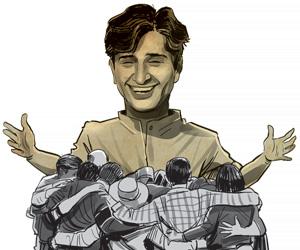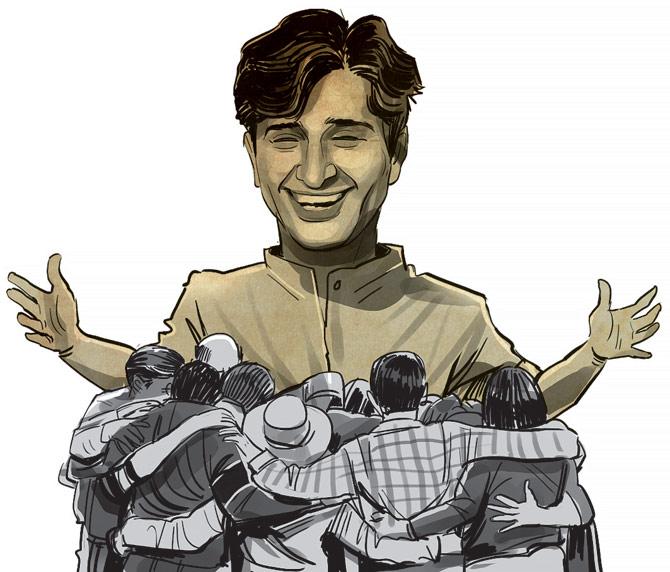The most-worshipped of Indian male figures are often those who symbolise wounds and angst, who undertake warrior-like journeys of battle, domination and ostentatious upliftment of the downtrodden

 The most-worshipped of Indian male figures are often those who symbolise wounds and angst, who undertake warrior-like journeys of battle, domination and ostentatious upliftment of the downtrodden. Shashi Kapoor, who passed away last week, was not, praise be, among these. His luminous beauty, his grace even when awkward with standard filmi performance tropes, his mischievous and inclusive smile, and his delicate acting were among his many noted qualities. But perhaps most special about him was an uncommon kind of masculinity that he embodied as a public figure.
The most-worshipped of Indian male figures are often those who symbolise wounds and angst, who undertake warrior-like journeys of battle, domination and ostentatious upliftment of the downtrodden. Shashi Kapoor, who passed away last week, was not, praise be, among these. His luminous beauty, his grace even when awkward with standard filmi performance tropes, his mischievous and inclusive smile, and his delicate acting were among his many noted qualities. But perhaps most special about him was an uncommon kind of masculinity that he embodied as a public figure.
ADVERTISEMENT

Illustration/Uday Mohite
On screen, he comfortably ceded space to others - brooding, macho male stars like Amitabh Bachchan or feisty female stars like Rakhi, Sharmila Tagore and Neetu Singh. Off-screen he often said the actor Nanda was his mentor - one can't think of many men who speak collegially about women, leave alone concede guidance, even though they put their mother's name in the middle of theirs. He manifested no attention-seeking broodiness, but was that rare cheerful hero, a sunny presence, willing to charm the heroine and others. In that willingness to charm, lay a kind of egalitarianism, an acknowledgement that each relationship must be built on its own terms, between individuals, through a built connection, not only through identities and roles.
In a 1991 interview to India Today, he said about his film career: "It was just to get a job, to support my family. To play your part and get on with it. I didn't aspire to be a star so it never inflated or deflated me." How often do we get to hear a statement so free of self-aggrandizement and self-importance? Of his later career he said, "My mum and dad had died and I missed them. I told Jennifer [his partner] I would love to make a theatre and a film I'm proud of. She said, why don't you? And so I did." Even rarer, is to hear public figures privilege their psychological world in this way, to define oneself in terms of a personal search. His work, in theatre, mainstream film and art film, as actor, producer and director, reveals a breadth, an idea of success which is based not on winning or being The One, but on carrying out this personal search, living out one's varied desires and doing it with others.
I remember being surprised to see Shashi Kapoor at Flora Fountain during a peace rally following the 1992-1993 Bombay riots. There were other stars present, though none so mainstream, who made small speeches and left. Mr. Kapoor though, sat quietly collecting signatures on a petition, from passers-by, lending a hand in the work that had to be done, as a citizen. Many who would have gone to Prithvi theatre would've seen him similarly attend performances or meetings, be a part of things. It is as if he cherished being part of a collective - family, ensemble cast, the city, the world. In that sense, Shashi Kapoor symbolised a gentle but vital idea - that of being a householder, one who lives in the world, but also with it; one who treats the entire world as if it is their home, and so, involves himself in keeping it going, not just in the heading of it. It is a lost idea of affectionate symbiosis we are aching for in these perpetually strategic times.
Paromita Vohra is an award-winning Mumbai-based filmmaker, writer and curator working with fiction and non-fiction. Reach her at www.parodevipictures.com
Catch up on all the latest Mumbai news, current affairs from Mumbai, local news, crime news and breaking headlines here
Download the new mid-day Android and iOS apps to get updates on all the latest and trending stories on the go
 Subscribe today by clicking the link and stay updated with the latest news!" Click here!
Subscribe today by clicking the link and stay updated with the latest news!" Click here!







